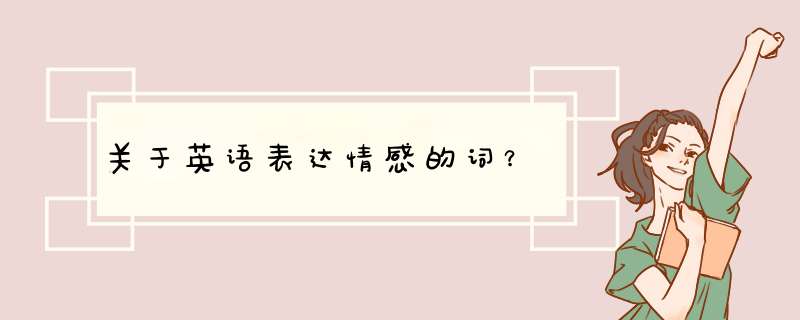
absolutely!-绝对正确
adorable!-可爱极了
amazing!-太神了
anytime!-随时吩咐
almost!-差不多了
awful!-好可怕啊
after
u-您先
about
when-大约何时
all
set-一切妥当
allow
me!-让我来
baloney!-胡扯!荒谬
behave!-放尊重点
bingo!-中了
boring!-真无聊
brovo!-太棒了
bullshit!-胡说
crazy!-疯了
deal!-一言为定
disgusting!-好恶心呀
drat!-讨厌
Encore!-再来一次!
Exactly!-完全正确!
Fantastic!-妙极了!
Farewell!-再见!
Fifty-fifty!-对半分!
Foul!-犯规了!
Fresh!-好有型!
Gesundheit!-保重!(特别用于对打喷嚏的人说)
Gone!-跑了!
Gorgeous!-美极了!
Hopefully!-希望如此!
Horrible!-好可怕!
Hot!-好辣!
Hurrah!-万岁!
Hush!-(肃静)嘘!
Incredible!-不可思议!
Indeed-真的?
Liar!-你撒谎!
Lousy!-差劲!
Marverllous!-棒极了!
Outrageous!-不得了!
Please!-拜托了!
Probably!-很可能!
Present!-到(有)!(用于点名时)
Relax!-放轻松!
Rats!-差劲!
Speaking!-(打电话时)我就是!
Still-仍是这样?
Someday!-改天吧!
So
so!-马马虎虎!
Satisfied-满意吗?
Stingy!-小气鬼!
Superb!-棒极了!
Surprise!-给你一个惊喜!
Terrible!-好可怕!
Thirsty-渴吗!
Toast!-干杯!
Unbelievable!-难以置信!
Unisex-男女通用的?
Willingly!-很乐意!
这里有大量经典英文小说,包括许多著名的爱情故事。里面表达感情的词汇也应有尽有。
英语图书网:海量免费英文经典读物,提高英语新捷径
http://wwwenglish-booksnet/
参考资料:
知识点相关讲解这其实是现在分词和过去分词的区别:
表示情感的及物动词如excite, discourage, disappoint, encourage, inspire, interest, move, please, puzzle, surprise, worry等,其分词常加上后缀-ing或-ed转化为分词(也可称为形容词),用作表、定、状或补语。在这种情况下,分词主要体现了语态的不同。现在分词有主动意味,含有“具有令人……的特性”的意思;而过去分词有被动意味,含有“受到影响而感到……”的意思。例如:
In Aswan, there are plenty of interesting places to visit 阿斯旺有许多值得一去的地方。
Some people whose lives are full are always interesting to talk to 有些人的生活经历丰富,与他们交谈总是令人感兴趣的。
If I can find you any support, would you be interested 假如我能为你找到资助,你对此有兴趣吗?
但是,由不及物动词转化而成的分词作形容词时,则体现了时态的不同。现在分词表示该动作正在进行,而过去分词表示该动作已经完成。例如:
The woodcutter was standing next to a fallen tree 那个樵夫站在一棵伐倒的树旁。
fallen leaves落(在地上的)叶(比较:a falling leaf一片飘落的树叶)
boiled water(煮)开(过的)水(比较:boiling water沸腾着的水)
the risen sun升得老高的日头(比较:the rising sun初升的太阳)过去分词和现在分词作定语
一、过去分词作定语
作定语用的过去分词相当于形容词,其逻辑主语就是它所修饰的名词及物动词的过去分词作定语,既表被动又表完成;不及物动词的过去分词作定语,只表完成
1 过去分词用作定语,如果是单个的,常置于其所修饰的名词之前
We must adapt our thinking to the changed conditions 我们必须使我们的思想适应改变了的情况
2 过去分词短语用作定语时,一般置于其所修饰的名词之后,其意义相当于一个定语从句,但较从句简洁,多用于书面语中
The concert given by their friends was a success他们朋友举行的音乐会大为成功
3过去分词短语有时也可用作非限制性定语,前后常有逗号
The meeting, attended by over five thousand people, welcomed the great hero 他们举行了欢迎英雄的大会,到会的有五千多人
4 用来修饰人的过去分词有时可以转移到修饰非人的事物,这种过去分词在形式上虽不直接修饰人,但它所修饰的事物仍与人直接有关
The boy looked up with a pleased expression 男孩带着满意的表情举目而视
二、现代分词作定语
单个分词作定语时放在所修饰名词前,分词短语作定语时放在后,并且名词与现在分词之间存有逻辑上的主谓关系,这是区分现在分词作定语和动名词作定语的判断方法之一 。
eg a running boy
the girl standing there
并且一般都可以转化为一个进行时的定语从句
eg a boy who is running
a girl who is standing there
注意1:分词的完成时不可作定语
注意2:在message/letter/sign/news/notice等词后要用现在分词作定语,不用过去分词,这是考试的易错点。
注意3:某些现在分词作定语时,已不再表示动作,已经从分词变为了形容词词性 egan interesting story/an exciting match 这些也可以属于现在分词作定语,但是不能转化为相应的定语从句,但是可以有三级变化(原级/比较级/最高级)和被某些副词如very修饰。 一:
英语中有一些动词能带-ing而不能带不定式,这类常见的有:admit,acknowledge,anticipate,advocate,appreciate,avoid,can\'t help,can\'t resist,can\'t stand,consider,defer,delay,deny,detest,deslike,don\'t mind,escape,excuse,fancy,favor,finish,enjoy,put off,resent,risk,stop等
eg I cant\'t resist bargaining
2动词+宾语+介词+ -ing
一般常见的介词是into
eg I shamed him into returning the stolen money
这类结构的动词有blackmail,deceive,fool等,
还有介词是from的
eg What kept you from joining me
这类的基本含义是“使不”,有时候,from也可以省略
eg Imust stop you (from) destroying yourself
但是要注意如果是被动语态的时候,不能省略
二:
既能接-ing 又能接不定式的动词
attempt,begin,continue,like,need,love, omit,preger,start等,这类此无论接纳个,基本意义没什么太大区别。
还有一种就是接的不同意义不同
forget,remember,go on, mean, stop等 动词ed与动词ing作形容词用法之一: ○1 动词ed作形容词:表示被动或已发生,常作定语。The boy named Peter is my friend 那个叫做彼得的男孩是我的朋友。
此处是后置定语,划线部分起修饰作用,下同。
He’s eating fried chicken “他在吃炸鸡。”做chicken的前置定语。
There is no time left “没时间剩余了。”做time的后置定语。
I have read a novel written by Lu Xun我读了一部鲁迅写的小说。做后置定语。下同。
He lives in a house built twenty years ago 他住在一个二十年前被建造的房子里。
一般来说,定语部分不只一个词时, 常放在名词的后面。
动词ing作形容词:表示正在进行或表示功能,常作定语。
the crying boy, a running bus, the rising sun, a bus running on the road,
the boy crying in the corner (以上表示正在进行)
a sitting room, the bathing suit, a cutting machine, writing paper…… (本行表示功能)
由一些及物动词派生而来,和心理感受有关,但ed修饰人,ing常修饰物。 以下词凡是译为“使…”的及物动词,其ed形式的形容词都译为“感到…的”,其ing形式的形容词都译为“令人(感到)…的”。以下带-ed形式的词的各个短语一般都译为“对…感到…”。
及物动词, 后接人 ed形式及常见短语
excite(使兴奋,使激动) excited (be ~d about)
surprise(使惊讶,使吃惊) surprised (be ~d at)
amaze(使吃惊) amazed (be ~d at)
embarrass(使尴尬) embarrassed(be ~ed in)
encourage(使受鼓舞, 鼓励) encouraged(be ~ed at / by)
frustrate(使失望,使沮丧) frustrated (be ~d of)
interest(使感兴趣) interested (be ~ed in)
thrill(使激动/ 紧张) thrilled (be ~ed at)
terrify(使恐怖,使害怕) terrified (be terrified at/ of / with)
please (使高兴,使满意) pleased (be ~d with)
satisfy (使满意) satisfied(be satisfied with)
frighten (使害怕,使惊惧) frightened (be ~ed at / of )
tire(使厌烦) tired (be ~d of)
bore(使厌烦) bored (be ~d with)
relax(使放松) relaxed (无固定搭配)
fascinate(使着迷) fascinated (be ~d by)
ing形式
exciting
surprising
amazing
embarrassing
encouraging
frustrating
interesting
thrilling
terrifying
pleasing, = pleasant
satisfying
frightening
tiring
boring
relaxing
fascinating
annoying
moving
worrying
confusing
move(使感动)
worry(使担忧)
confuse(使困惑)
His words amazed me The news frustrated us very much (都是及物动词,后接人)
His words were amazing (修饰物) I was amazed at his words (修饰人)
How exciting the film is! (修饰物) He was moved by the movie (修饰人)
快乐兴奋 Happy /pleased /glad /jolly /Excited /Joyful /Laughing heartily chirrupy 方快活的 delectable 令人愉快的,使人高兴的 gladsome 高兴的/ 可喜的 good-humored 心情愉快的,脾气好的 hedonic 快乐的
欢迎分享,转载请注明来源:浪漫分享网

 微信扫一扫
微信扫一扫
 支付宝扫一扫
支付宝扫一扫
评论列表(0条)